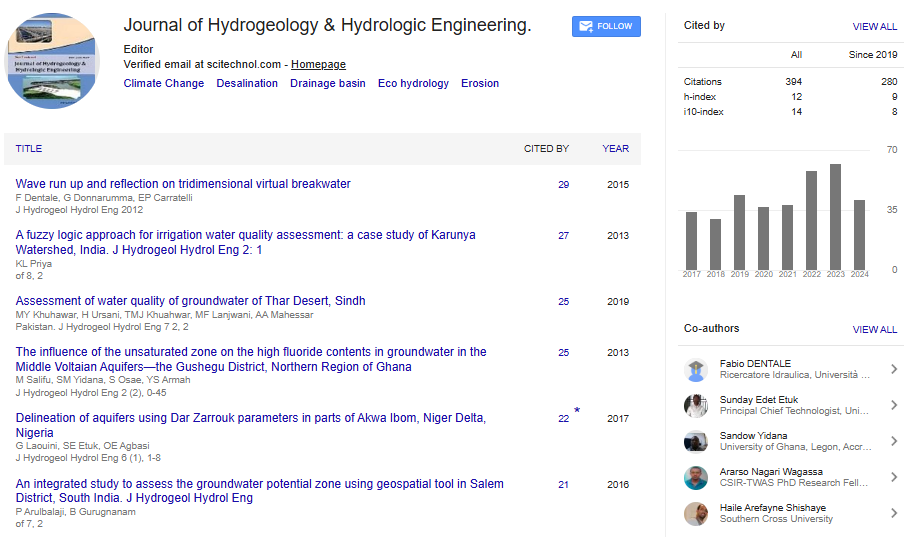Perspective, J Hydrogeol Hydrol Eng Vol: 12 Issue: 4
The Value of Freshwater for Organizations and Streams of Life
Jeffery Cannon*
1Department of Environment Science, University of Saskatchewan, Saskatoon, Canada
*Corresponding Author: Jeffery Cannon,
Department of Environment Science,
University of Saskatchewan, Saskatoon, Canada
E-mail: cannonj48@gmail.com
Received date: 17 July, 2023, Manuscript No. JHHE-23-114466;
Editor assigned date: 19 July, 2023, PreQC No. JHHE-23-114466 (PQ);
Reviewed date: 03 August, 2023, QC No. JHHE-23-114466;
Revised date: 11 August, 2023, Manuscript No. JHHE-23-114466 (R);
Published date: 21 August, 2023, DOI: 10.4172/2325-9647.1000277
Citation: Cannon J (2023) The Value of Freshwater for Organizations and Streams of Life. J Hydrogeol Hydrol Eng 12:4.
Description
Water, often referred to as the "elixir of life," is undoubtedly one of the most vital elements for human existence. It sustains us, nourishes our crops, and serves as the lifeblood of ecosystems around the world. In this context, rivers, with their meandering paths and dynamic flows, play a central role in providing communities with clean and accessible water. The significance of clean water from rivers cannot be overstated, as it directly affects the health, prosperity, and overall wellbeing of communities worldwide.
Rivers, often described as the veins of the Earth, crisscross the landscape, carrying with them the life-sustaining essence of water. They serve as a primary source of freshwater for countless communities, supplying drinking water, irrigation for agriculture, and support for various industrial processes. Clean water from rivers is essential for maintaining public health and preventing waterborne diseases. Communities that have access to clean river water experience lower rates of illness and infant mortality, contributing to longer and healthier lives.
Clean river water also plays an essential role in agriculture, which is the backbone of many communities. Farmers rely on rivers for irrigation to nourish their crops, enabling them to produce the food we need to sustain our growing global population. Without clean water from rivers, agriculture would be severely hampered, potentially leading to food shortages and higher prices. Additionally, the quality of river water directly affects the health of aquatic ecosystems, which, in turn, influence the sustainability of fisheries, a vital source of nutrition and livelihood for many communities.
Beyond its practical importance, clean river water has profound cultural and recreational significance. Rivers often hold special meaning for communities, serving as focal points for cultural rituals, ceremonies, and traditions. They offer spaces for recreation and leisure, providing opportunities for fishing, swimming, boating, and simply enjoying the natural beauty of the environment. Clean rivers are essential for preserving these cultural and recreational aspects of life, fostering a sense of identity and connection to the land.
However, the availability of clean water from rivers is not guaranteed. Rivers worldwide face numerous threats, including pollution, over-extraction, and the impacts of climate change. Pollution from agricultural runoff, industrial discharge, and urban development can contaminate river water, making it unsafe for both human consumption and ecosystem health. Communities located near polluted rivers often suffer from a host of health problems, including waterborne diseases and contaminated food sources.
Over-extraction of water from rivers for irrigation, industrial purposes, and municipal water supply can lead to reduced water flows and, in some cases, the complete drying up of rivers. This not only threatens the availability of clean water but also disrupts ecosystems and wildlife habitats that depend on these water sources. Climate change exacerbates these issues by altering precipitation patterns and causing more frequent and severe droughts, further straining river ecosystems and the communities that depend on them.
Addressing these challenges requires a multi-faceted approach. Communities, governments, and organizations must work together to implement effective water management strategies that prioritize clean water access for all. This includes adopting sustainable agricultural practices to reduce pollution and water consumption, implementing wastewater treatment systems to prevent industrial pollution, and investing in infrastructure to provide safe drinking water to communities.
Furthermore, protecting and restoring river ecosystems is essential for ensuring the long-term availability of clean water. This involves preserving natural river flow patterns, preventing habitat destruction, and conserving biodiversity. Reforestation and wetland restoration can also help filter pollutants from runoff before they reach rivers, improving water quality.
The significance of clean water from rivers for communities cannot be overstated. It is a fundamental resource that supports life, sustains livelihoods, and enriches cultures. To safeguard the health and wellbeing of present and future generations, we must recognize the importance of clean water from rivers and take proactive measures to protect and preserve these invaluable resources. By working collectively to address the challenges facing our rivers, we can ensure that they continue to flow as the lifeblood of our communities for generations to come.
 Spanish
Spanish  Chinese
Chinese  Russian
Russian  German
German  French
French  Japanese
Japanese  Portuguese
Portuguese  Hindi
Hindi 
